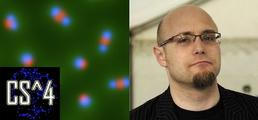Seminar 1st April 2011 4 p.m. University of Southampton, Building 58 (Social Sciences), Room 1007
The Origin and Evolution of Chemical Engines
Nathaniel Virgo
Centre for Computational Neuroscience and Robotics (CCNR), University of Sussex
- Web page
- http://www.informatics.sussex.ac.uk/users/ndv21/
- Categories
- Agents, Complex Systems, Ecology, Energy, Evolution, Molecular Dynamics, Systems biology
- Submitter
- Petrina Butler
Complex Systems Simulation Seminar Series (CS^4)
from the Institute for Complex Systems Simulation, the Complexity in Real-World Contexts USRG, and the Computational Modelling Group.
Video available here
Speaker
Nathaniel Virgo
http://www.informatics.sussex.ac.uk/users/ndv21/
http://www.informatics.sussex.ac.uk/research/groups/ccnr/index.html
Abstract
Living organisms can be thought of as self-maintaining machines that must use up an external energy source in order to maintain their structure. In this talk I will explore the consequences of this observation for our understanding of biology and ecology. I will ask how such machines might have arisen from an initially lifeless chemical soup and argue that the negative feedback caused by a limited energy supply may have played an important role. I will demonstrate that simple self-maintaining machines can arise in computational models of physical systems, and I will present some progress towards creating self-maintaining machines of much greater complexity.
I will begin with an explanation of the constraints that the laws of thermodynamics put on organisms' metabolism, using the metaphor of a self-maintaining heat engine --- a hypothetical machine built out of cogs and pistons, which must use an external heat source to repair and reproduce itself. The constraints on living organisms are similar, except that the components of organisms are microscopic and their energy source is usually based on chemistry rather than heat.
I will present an ecosystem model based on the idea of an evolving population of engines, all feeding off the same limited supply of energy. One of the consequences of this is that the availability of energy tends to decrease as metabolisms become more efficient. This has possible implications for the origins of life, since it implies that conditions on the early Earth might have been conducive to the survival of much simpler organisms than can exist in today's environments.
I will then argue that, contrary to intuition, self-maintaining chemical machines need not be very complicated, and simple ones often form spontaneously in physical systems. I will give demonstrations of this, using simulations of a simple type of physical-chemical system known as a reaction-diffusion system. Within these systems, blurred but individuated ``spots'' of chemical activity can form. Although they are extremely simple, these spot patterns have many of the properties of living organisms, including physical self-maintenance and self-reproduction, stability to perturbations, and even adaptive behaviour (what they lack, however, is evolution by natural selection). I will show how a globally limited supply of energy can encourage the formation of these machines, effectively tuning the parameters of the system to the regime where the spots can persist.
I will also demonstrate the formation of systems more complex than a single spot, some of which even exhibit a very limited form of heredity. This paves the way towards asking how the complex and specific organisms we know today might have arisen from the simpler types of chemical engine that could have formed spontaneously in the past.
Real living cells encompass a much wider range of physical phenomena than reaction and diffusion. One interesting possibility would be to construct a model based on molecular dynamics which can demonstrate the spontaneous formation of individuated dissipative structures on the molecular scale. I will present some preliminary progress toward this.
Refreshments
Available from 3:30pm, lecture starts at 4pm.
Complex Systems Simulation Seminar Series
For the complete CS^4 schedule please click here: http://www.multidisciplinary.soton.ac.uk/cs4.html
Contact
Multidisciplinary Research Co-ordinator
University Strategic Research Groups
Research and Innovation Services
02380 593244
